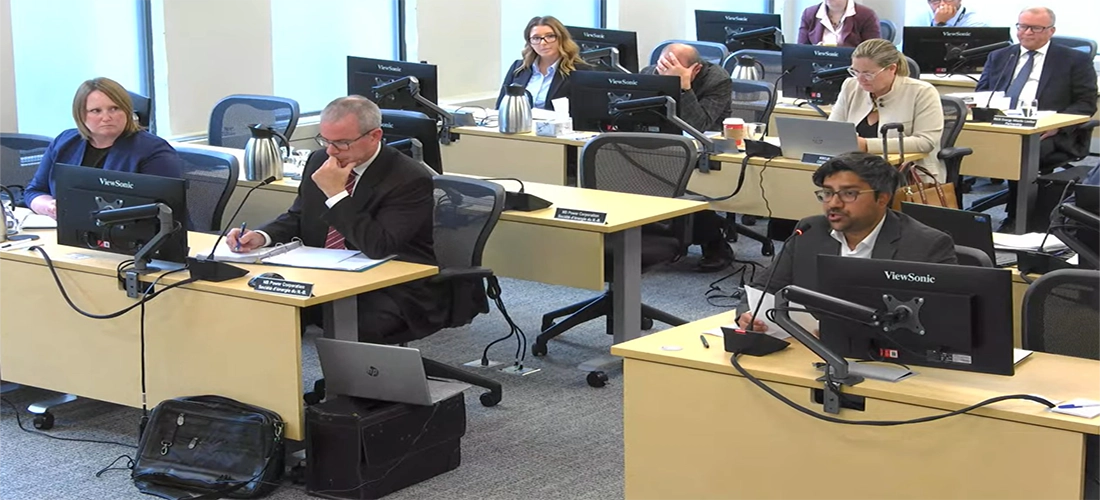Electric School Buses
Let's power up New Brunswick's school transportation
The New Brunswick Government has committed to electrifying New Brunswick's School Bus fleet by 2035!
New Brunswick has nearly 95,246 students who ride diesel, gasoline, and propane buses to and from school. A growing number of schools are now switching to electric school buses because they emit fewer emissions, cost less, and offer better comfort and safety than traditional buses.
Let's hold the New Brunswick Government accountable, ask for electric buses to be placed at your local school!
It’s time to retire diesel, gasoline and propane buses because electric school buses just make sense. They are better for our kids’ health. They don’t emit exhaust that hurts students’ health—at any exposure level—and they don’t emit carbon pollution that contributes to climate change and extreme weather.
And, we know kids love them—a bus driver who participated in New Brunswick’s pilot project for electric buses told us that his students were proud that their bus was helping to tackle climate change and making our streets a little healthier.
Students are on board — Are you?
"It's really cool that I get to ride on a bus that's so helpful to the environment — I think its a really big step forward."
Amelia Hicks (Grade 4)
"Companies are now going electric because that's the future of vehicles. I hope to see more around the world and more people get to ride them."
Malcolm Hocken (Grade 8)
Health Experts Expose Dangers of Gas-Powered School Buses
This report outlines clear, easy steps for parents, teachers and community members to create cleaner air and healthier communities for our kids. Let’s work together to bring electric buses to our province!
MORE RESOURCES
Why should your school make the switch?
Electrifying the entire New Brunswick school bus fleet will eradicate more than 22,500 tonnes of greenhouse gas emissions every single year and dramatically improve the air quality that our children breathe on their way to and from school every day.
We are living in a climate emergency, while also facing a health crisis where children’s hospitals are overstretched with kids struggling with respiratory issues. So we are proud of our government for taking action and setting the goal of electrifying our entire fleet by 2035. Protecting our children and the environment from pollution generated by diesel school buses.
Each electric school bus prevents 291 metric tons of climate pollution. Switching to electric school buses is not only going to lead to zero tailpipe emissions but also protect students’ (and drivers’) lungs by keeping diesel exhaust out of the air inside and outside of the buses.
Children are particularly susceptible to diesel pollutants during their daily commute to school due to their developing respiratory systems and faster breathing rates. Exposure to diesel and gasoline air pollution can also affect a child’s ability to learn at school. Electric school buses do not produce these diesel emissions, as they run on electricity.
Low-income communities and visible minority communities often face higher levels of air pollution. By introducing electric school buses in historically polluted areas, we will reduce the amount of diesel pollution and improve community health. Moreover, electric school buses will have a positive impact on the grid and promote equitable energy distribution.
Every school bus that transitions to electric can save around 20 tonnes of greenhouse gas emissions per year, and a complete transition to electric buses across New Brunswick’s school bus fleet will eliminate over 22,500 tonnes of emissions each year. Especially in schools, where we are trying to teach young people about climate change and action, the electrification of school buses is a meaningful action.
Electric school buses offer a more comfortable and peaceful ride for students due to their quiet operation, and drivers can better hear everything happening in the bus. With fewer rotating and moving parts, electric buses require less maintenance and have longer lifespans compared to diesel buses. This translates to a competitive cost advantage and improved reliability, making them a smart investment for schools.
How do I take action?
Electric school buses just make sense. They are healthier, more reliable and a safer choice for our children — but how do we make sure the government follows through on their promise? Take advantage of this helpful how-to guide to assist you in letting the government know your excitement for an electrified fleet and which school you’d like to see get electric school buses next!
There can be strength in numbers. You might want to work with a couple of friends, or present at a School Advisory Council (SAC) meeting or Parent Teachers Committee (PTC) meetings to get other parents interested in having their child’s school be the next to go electric
Having support is nice, but not essential.
The easiest and most effective way to find out where your district is in terms of bus electrification is to email or call the New Brunswick pupils transportation coordinator.
You’ll want to ask things like:
- Does the district have any electric buses?
- Do they have a plan/timeline for adding more electric buses?
- Are they purchasing buses this spring? How many of these will be electric?
- What are the barriers to adding more electric buses? Logistics? Cost? Uncertainty?
Let our government know what you expect them to hold up their commitment of fleet electrification and where you’d like to see the next electric buses placed.
Remember that District Education Council members are elected representatives. They’ll be happy to talk to you! Reach out by email or phone, and introduce yourself and the topic you’re looking to speak with them about. You might want to connect with sympathetic trustees to get feedback.
Next, present to your District Education Council.
Tell them how excited you are that they’ve chosen to protect children’s health and ask when you can expect electric school buses to come to your local school.
Use these links to help you contact your District Education Council:
- Anglophone School District South
ASD-S | Members (nbed.nb.ca) - Anglophone School District East
District Education Council | Anglophone East School District (nbed.ca) - Anglophone School District North
District Education Council | Anglophone North School District (nbed.nb.ca) - Anglophone School district West
District Education Council – Anglophone West School District (nbed.ca) - District scolaire francophone du Nord-Est
Membres du CED – DSFNE - District Francophone Scolaire Nord-West
CÉD members | North-West French School District (nbed.ca) - District Francophone Scolaire Sud
Membres – District scolaire francophone Sud (nbed.nb.ca)
Electric school buses are a big purchase. Things probably won’t change overnight. Keeping the dialogue open and following up is important.
If you’re interested in initiating a campaign in your community or collaborating with us to garner support, contact us at info@conservationcouncil.ca. We would be happy to work with you to bring about positive change for our children and communities.
Success story: Our neighbors in Prince Edward Island
Prince Edward Island (P.E.I.) is leading the way in Canada when it comes to electrifying school bus fleets. The Public Schools Branch added 35 electric buses in 2021, bringing the total number of electric buses to 82 in the province. P.E.I. has solved early-adopter challenges, including route planning, charging, and maintenance. A year later, the province is already seeing savings in fuel costs and a reduction in carbon emissions from transportation. With a 25 per cent electric school bus fleet, P.E.I. is well on its way to full electrification in the next decade.
The province’s success can serve as a model for other Atlantic provinces to pursue electric school buses through joint purchasing rates. By making the switch to electric school buses, provinces can contribute to a cleaner environment and better health for students and drivers.
Frequently Asked Questions
Electric buses use an electric motor and battery pack instead of a traditional internal combustion engine and can be recharged using a charging station or other power source. They are more efficient, require less maintenance, and can store large amounts of power, which can be sold back into the grid or used in emergencies with vehicle-to-grid transfer.
Most electric school buses can travel around 160- 250 kms on a single charge. The travel range of electric school buses can vary depending on a variety of factors, including the size and capacity of the battery pack, driving conditions, weather, and the route the bus is traveling. Buses are typically charged overnight (8 hrs), but fast charging (3 hrs) is also possible with some systems. They can also operate in cold temperatures – Alaska’ s first electric school bus is still running at -40!
Electric buses cost more upfront than diesel buses, but they can be cheaper in the long run due to 80% lower running costs and 60% lower maintenance costs. This can save school districts $20-$30K per year per bus. Upfront costs are expected to decline as battery technology improves and demand increases. Vehicle-to-grid transfer can add to financial savings by selling excess power back to the grid. Electric buses can benefit utility companies by expanding and stabilizing the grid, providing surplus energy storage, and responding to an increasing energy demand.
Electric School Buses: Here's How We Make It Happen!
More Stories
The electric school bus movement is growing across the world and we want New Brunswick to get on board!
Electric school buses just make sense. They are better for our kids’ health and they don’t emit carbon pollution that contributes to climate change and extreme weather.
It’s time to retire diesel, gasoline and propane buses. These vehicles emit exhaust that hurts students’ health at any exposure level.
And, we know kids love them—a bus driver who participated in New Brunswick’s pilot project for electric buses told us that his students were proud that their bus was helping to tackle climate change and making our streets a little healthier.
Now is the time to make the shift to electric.
Here in Canada, our neighbours in Prince Edward Island and Quebec are leading the charge, committing to a fully-electric school bus fleet over the next 10 years.
We can do the same in New Brunswick. We should be replacing all decommissioned diesel, gasoline and propane buses with electric buses and making a plan for a full shift over the decade ahead.
We can learn the best way forward from other jurisdictions and take advantage of federal government programs to help with the cost of transitioning. New Brunswick students deserve a safer way to get to and from school!
Check out the resources below to see how we can achieve a fully electric school bus fleet in New Brunswick—and sign our petition calling on government to get on board with the E-Bus movement!




